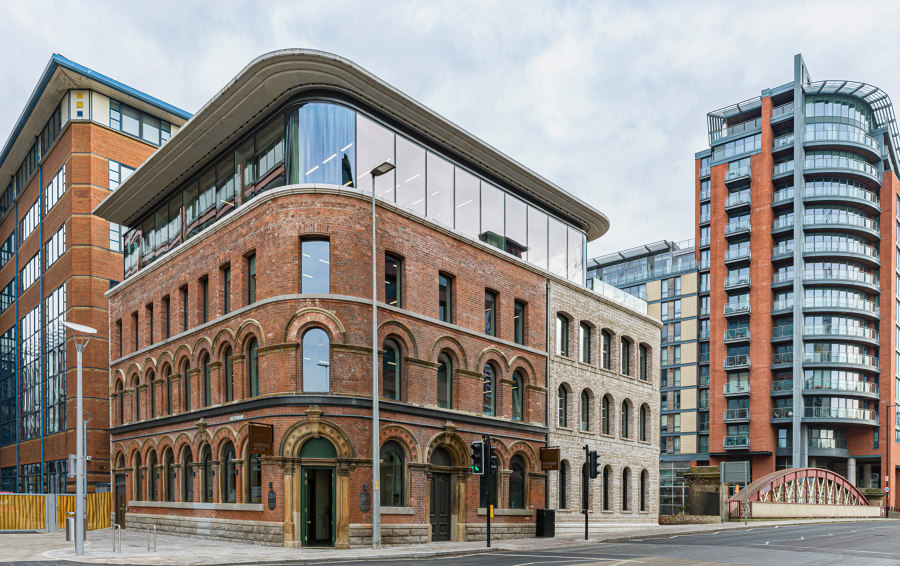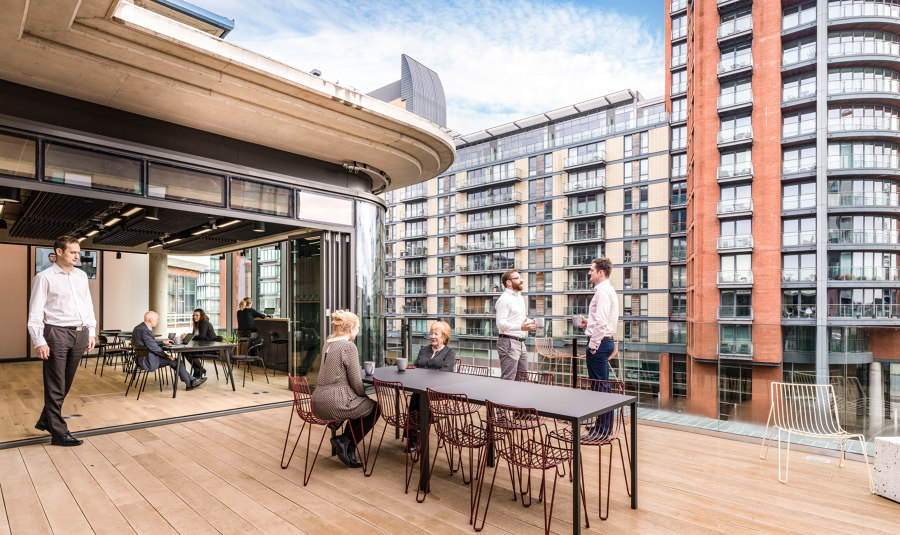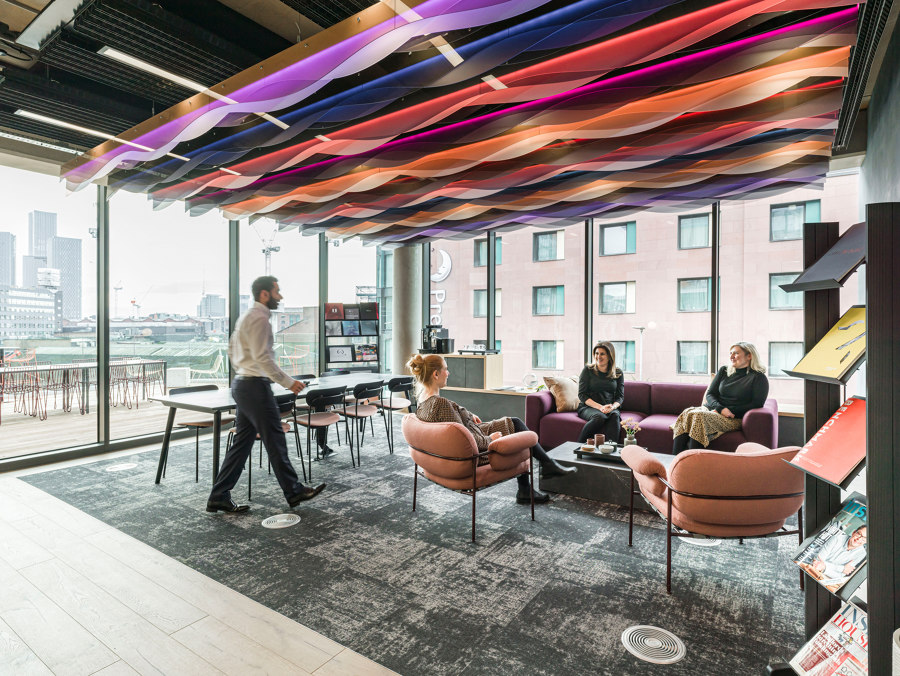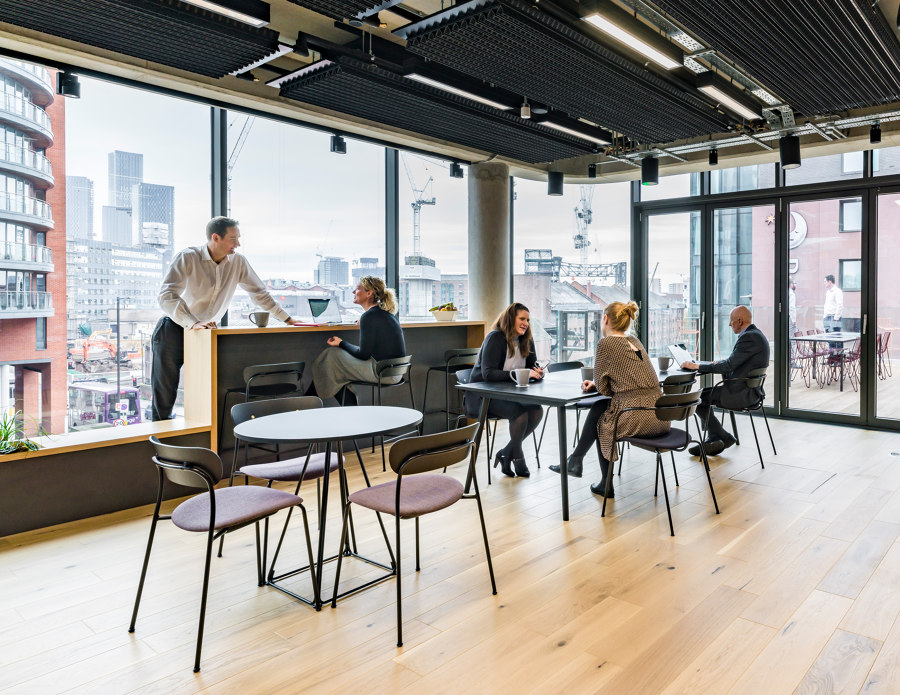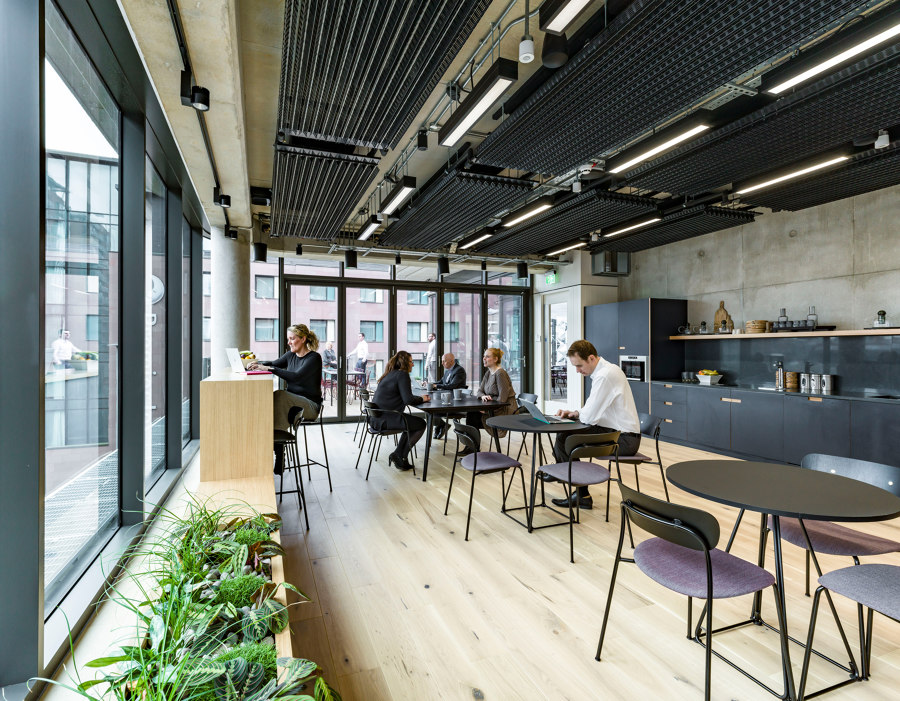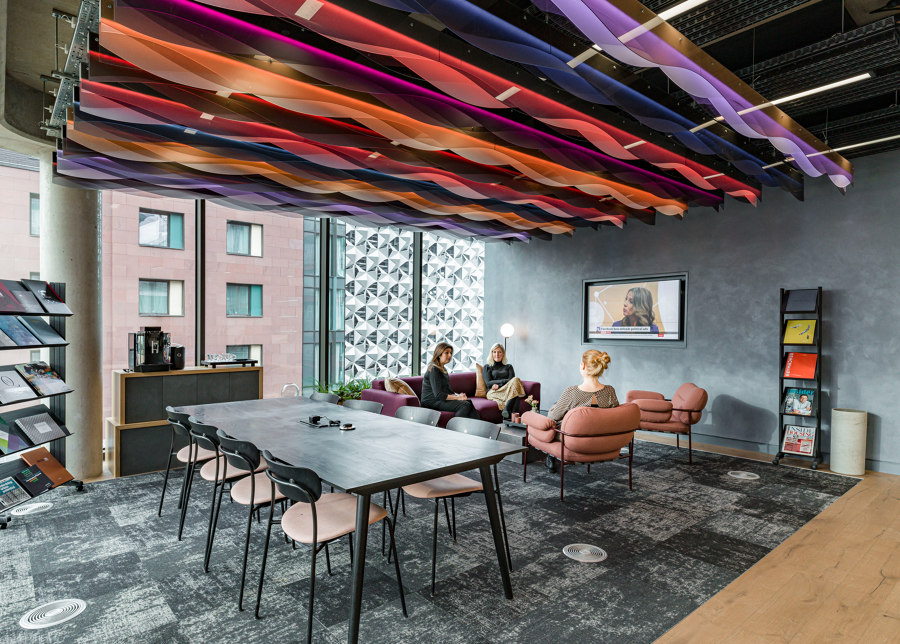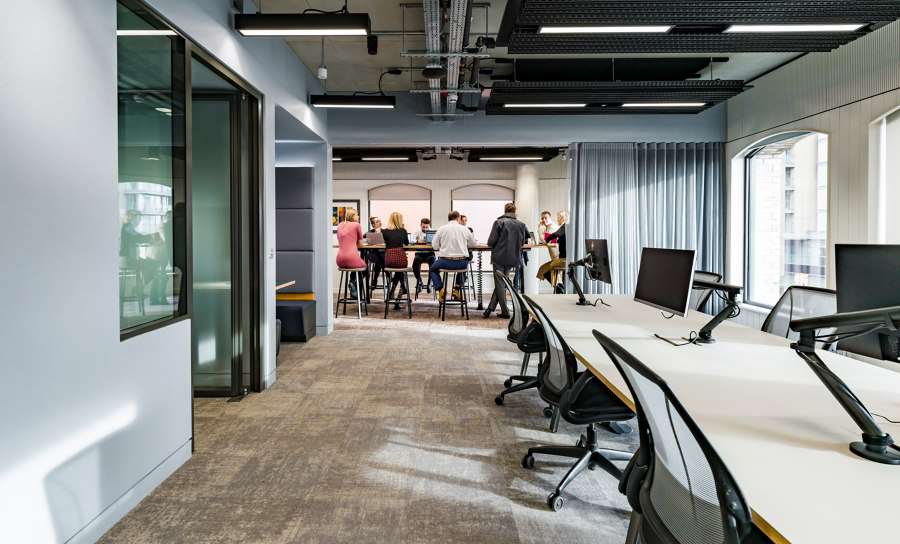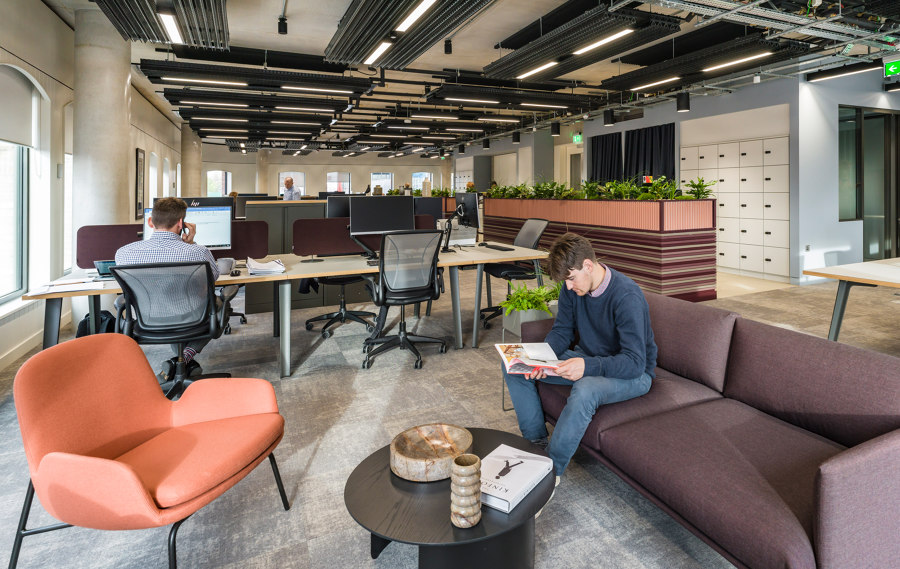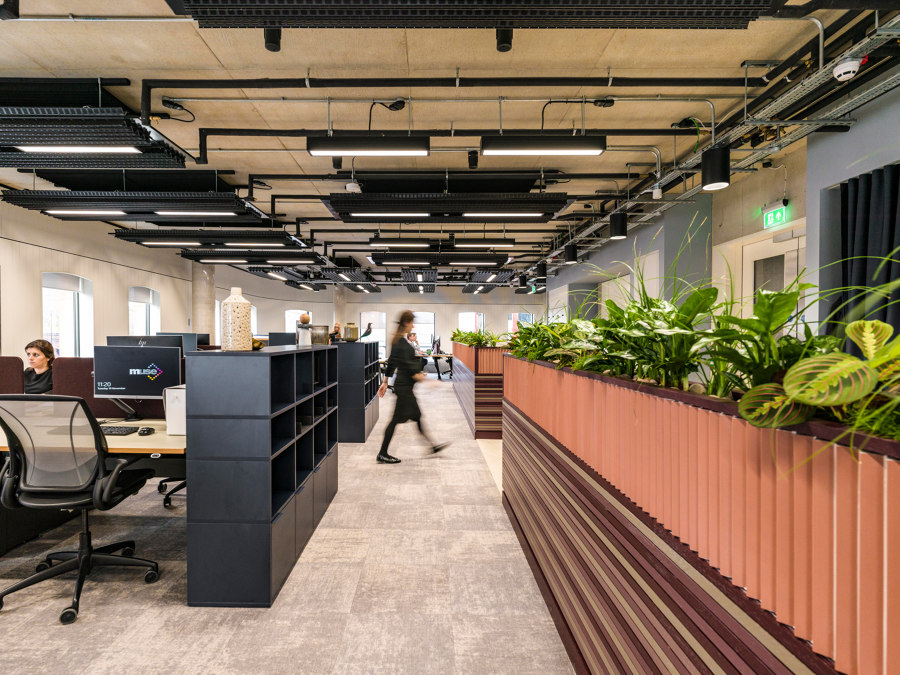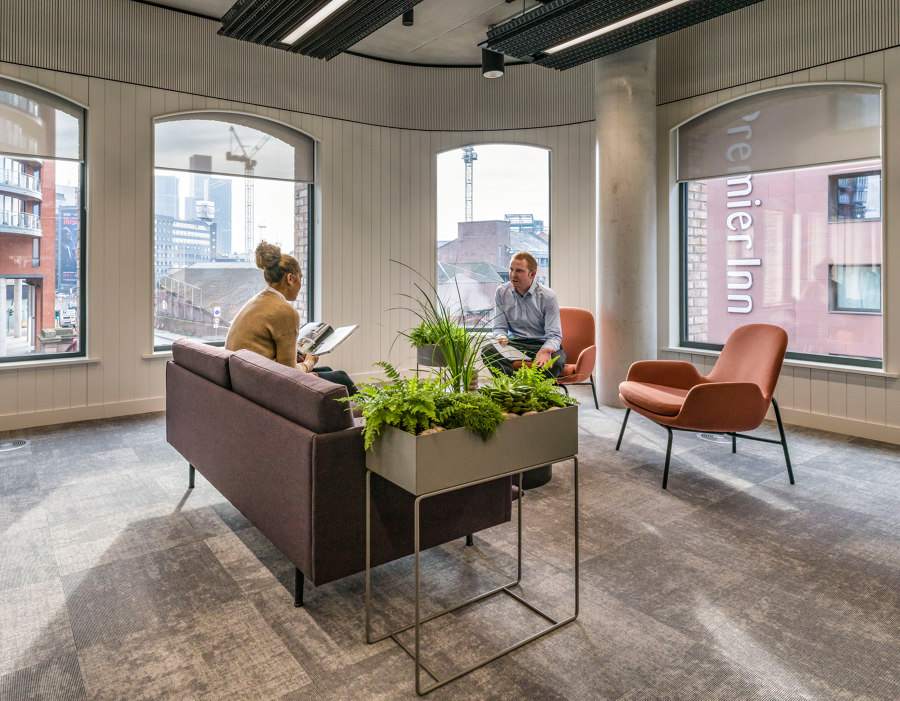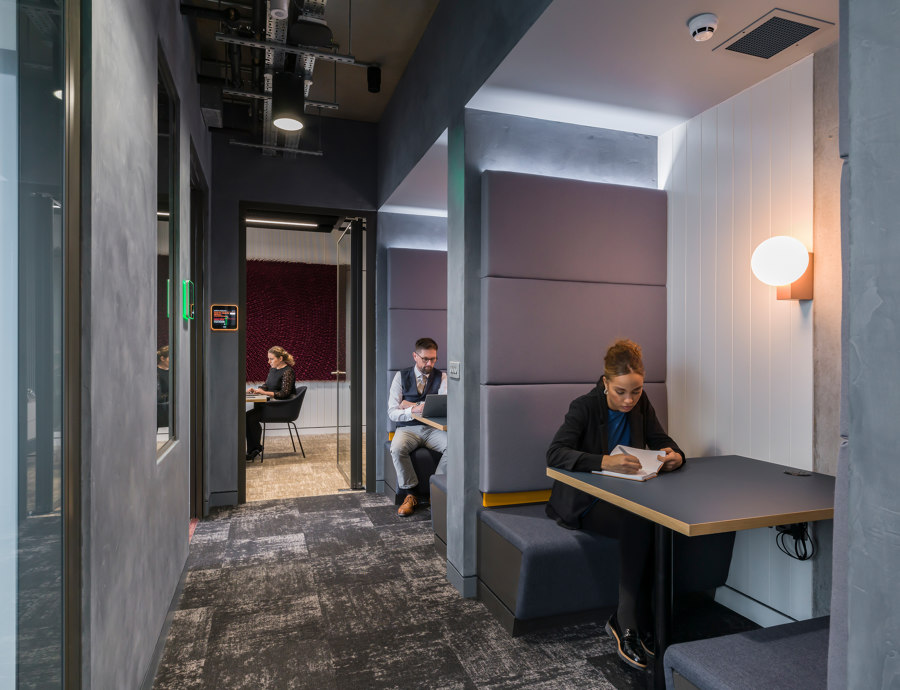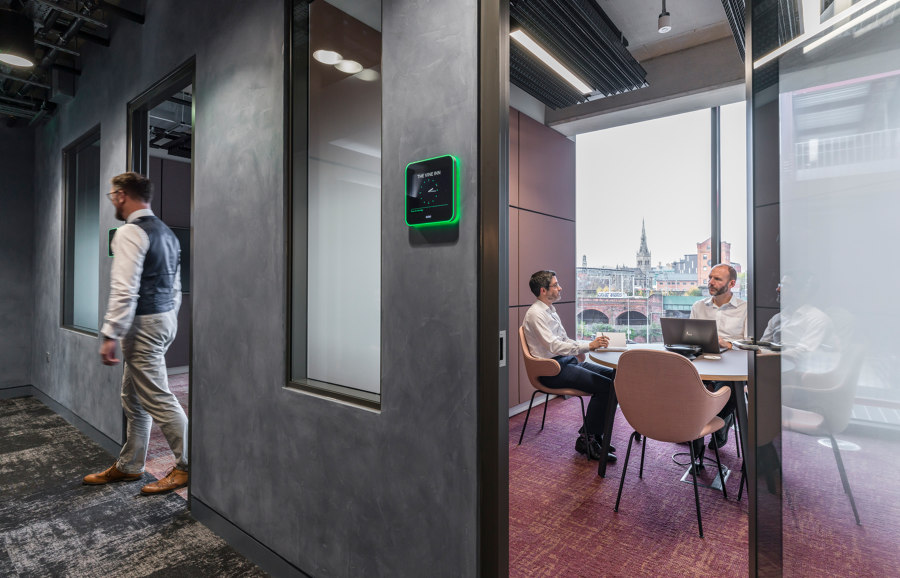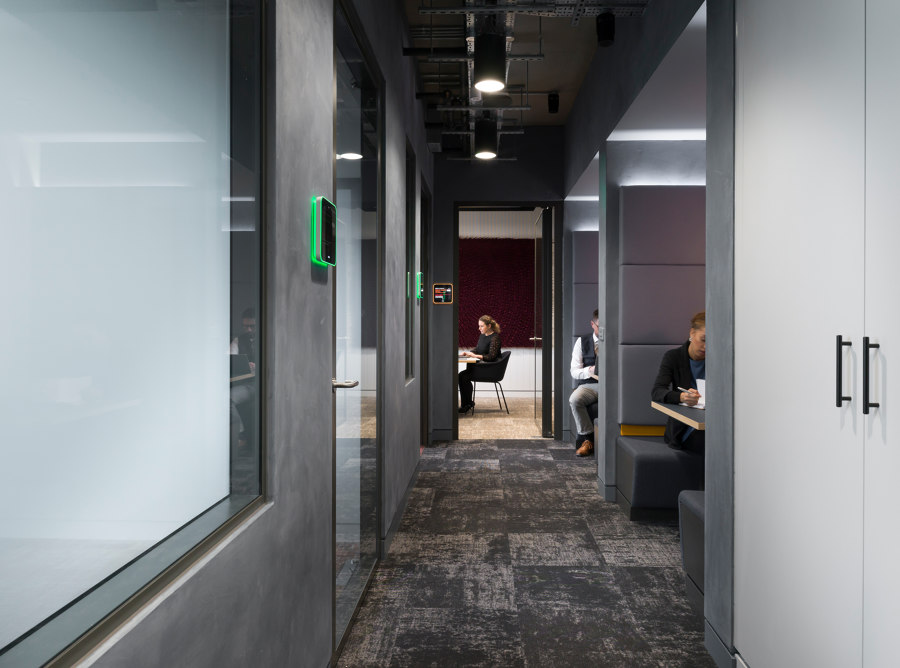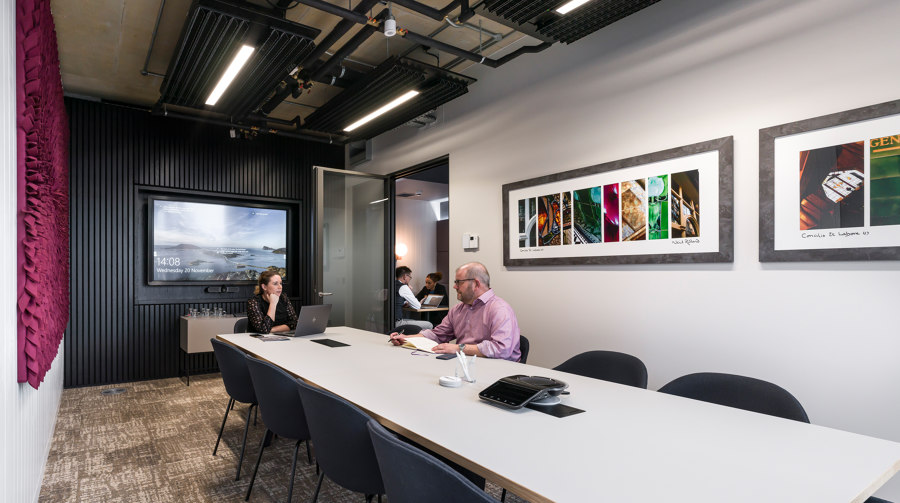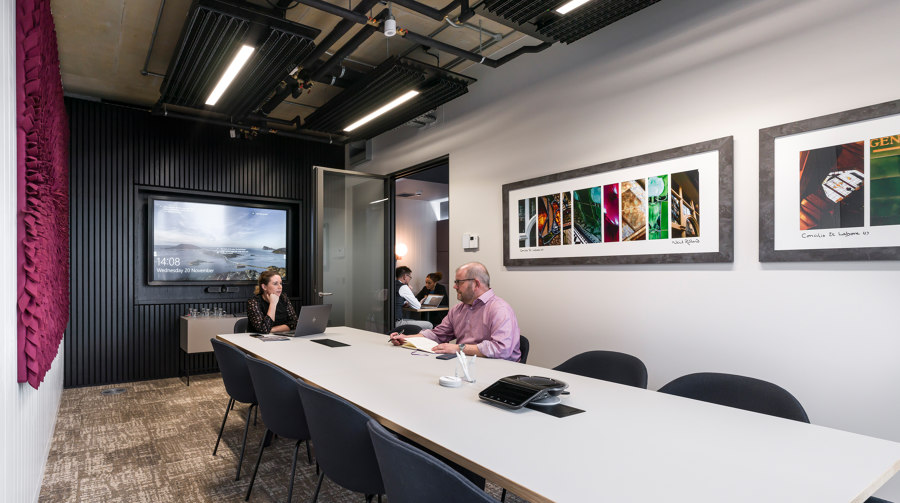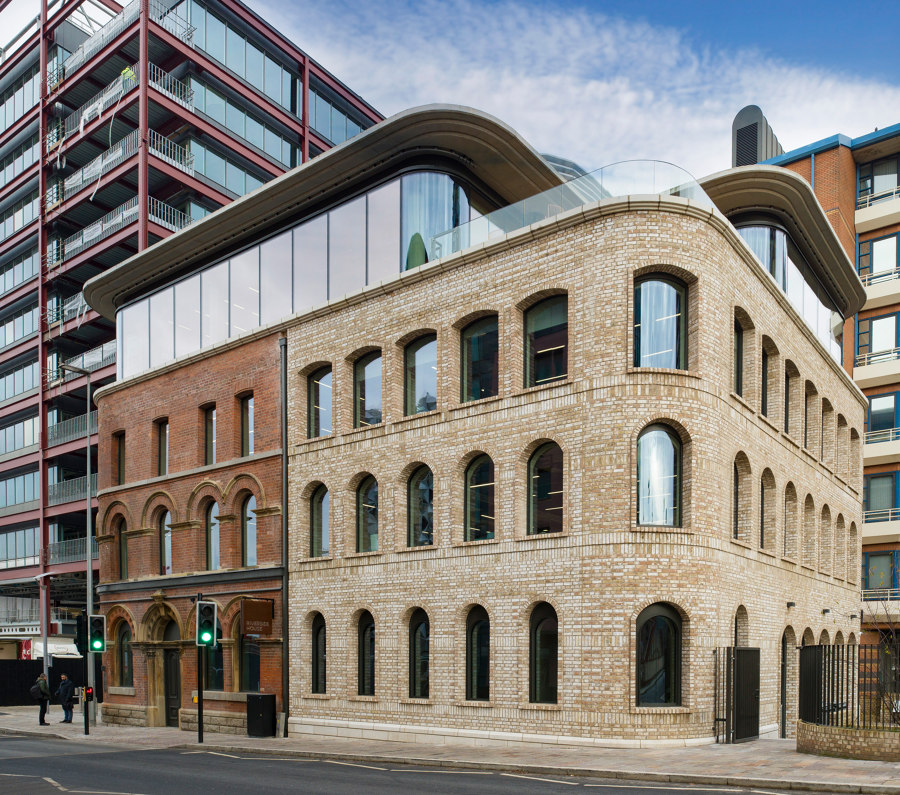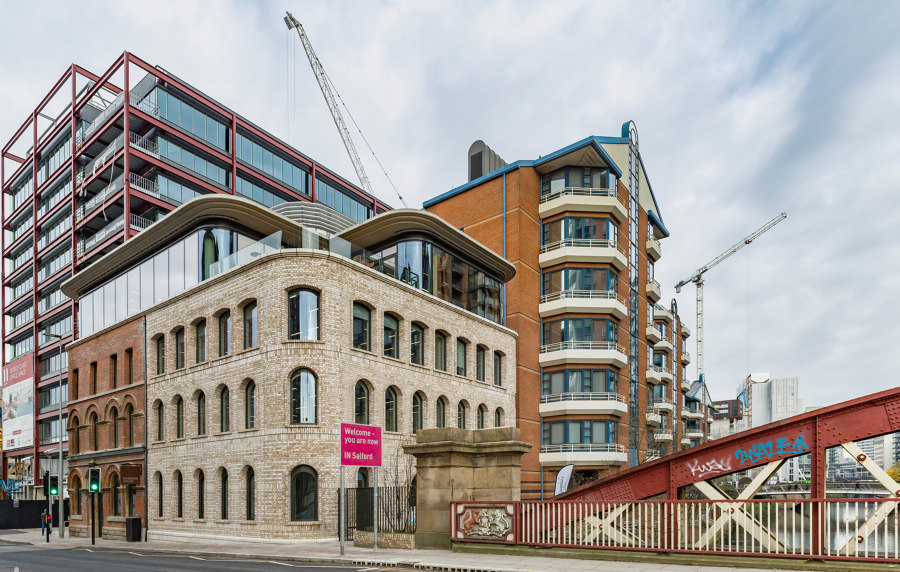A workplace scheme for national urban regenerator Muse Developments at Riverside House in Salford has just been announced the winner of the Fit Out of Workplace category at the BCO Northern Awards 2020. The 540 sq m scheme was designed by Manchester and Leeds-based interiors practice SpaceInvader, for whom this constitutes a third BCO Northern Awards title in the space of three years, having been double winners in 2018 for Hilson Moran in the Innovation category and Number One Kirkstall Forge in the Commercial Workplace category.
Riverside House, built in the 1860s, is a Grade II-listed building, adjacent to the old railway goods yard at New Bailey in Salford and located directly alongside the River Irwell. The building was locally listed but had stood in ruins for a number of years, before being acquired by the English Cities Fund for re-development. The main building structure was heavily damaged and the decision was taken by the fund to retain and repair the existing brick façade and construct a new, four-storey CAT A office with a brand-new structure. Muse then took the decision to relocate to Riverside House and signed a lease agreement with the fund.
Background – The Client
Muse is one of the country's leading names in mixed-use development and urban regeneration and is a national developer with regional operations in Manchester, London, Leeds and Glasgow. The company transforms the urban landscape through its partnerships, working across commercial, residential and mixed-use regeneration. It is part of Morgan Sindall Group plc.
SpaceInvader had previously worked with Muse on a number of residential projects and the developer had enjoyed the company’s process and approach on those collaborations, going on to choose them as the design partners for its new, future-facing Salford scheme. A thorough initial research stage was undertaken by SpaceInvader at the project’s outset to establish the brief and key objectives, which included prioritising substance over style, whilst at the same time providing a great-looking shop window and incorporating a new approach to ways of working that would promote collaboration and foster mutual appreciation, awareness and recognition within the Muse team.
‘We really needed to understand the thinking of the senior team and so interviewed the firm’s project managers, office director and central staff’, John Williams, Founder of SpaceInvader explained. ‘The process was very open, thorough and also two-way. Muse were as interested in the thinking behind our questions as we were in their answers. The great thing was we’d covered everything in such depth that by the time we got to space-planning that there couldn’t have been any other solution. The final designs were entirely rational, as well as being intuitive and responsive.’
Sustainability and waste reduction were also major aims of the project, whilst the concept also needed to reflect the building’s proximity to water and nature - with views, biophilia and outdoor decking all key.
‘What was great is that SpaceInvader helped us establish the brief. We needed to reflect our brand and ethos, but John and the team helped us to write the brief too, so it was a really interesting process’, Phil Marsden, Project Manager at Muse Developments commented.
At the time of appointment, the Muse team had set desks and no facility for agile working, though there was plenty of ambition surrounding how best to progress to embody a company developing office space for others that was also itself at the forefront of optimum practice.
‘The most important bit about working with SpaceInvader was the process in first couple of months – the interviews, the questionnaires and the site visits, during which they really got to know us, our brand and both how we used to work and the changes in working methods we wanted to bring in’, Phil Marsden added.
Design Approach
The intent for the new office was to allow the Muse team to move to an agile way of working, where desks were not allocated to individuals. Desks would be clear at the end of each day, with belongings stored in a locker. The overarching rationale was to provide colleagues with different places to work better suited to their tasks, whilst encouraging improved collaboration. By identifying the differing needs of all colleagues, the team was given options of where to work, knowing also this may change again in the future as the business and the demographic of future employees evolve.
The riverside location was also key to the design. Views of the river from Riverside House and the river’s effect on the surrounding city are at the heart of the concept. Not only does the river affect people, but also the built environment, with natural materials which make up the riverbed influencing the surrounding city.
The fit-out also makes reference to that, by keeping an underlining industrial aesthetic throughout. The project was about celebrating Salford as well as showing what the company can do for its own tenants, whilst the water outside, its movement, colours and the wildlife it attracts, particularly kingfishers, informed the colour scheme. The designers looked to the various strata of the riverbed to create a sense of horizontal layering, using tones of red from the local sandstone bed, combined with industrial textures to ensure a unique and sophisticated finish.
The Final Design
SpaceInvader liaised with the building’s refurbishment architects to ensure the design reduced waste as well as rendering the perfect space plan. For example, chilled beams and lighting units were moved to suit the meeting room layout and floor grilles moved to suit desk layouts. This minimised cost, disruption and also waste. There were also some specific enhancements requested by Muse to allow the CAT A design to blend seamlessly with the fit-out design. The wall linings were uplifted in a number of locations and a slatted timber finish created for the perimeter walls to the open plan floor plate, lending a domestic feel to the finishes palette, whilst arched window linings help frame views out towards Salford.
The internal space planning of Muse’s two floors – the second and the third - was thoroughly considered. The areas that captured the best views were reserved for the most active environments, such as shared desk space, the project room and staff kitchen. Alongside this, the floors were addressed differently in terms of function and atmosphere, with the second floor providing an open plan workspace with its adjoining alternative settings and the third floor providing the visitor / client experience.
All noise, lighting, circulation and toilet provision met BCO standards. An acoustic consultant was appointed who ensured all areas had the appropriate amount of acoustic finishes to control noise comfort. Upholstered seating, full height booth seating and specific acoustic wall treatments all work in tandem. All areas, including common parts, were designed using durable materials and intentionally viewed holistically alongside the base build finishes to give a consistent language ensuring fit-out and building character and identity, whilst the clear floor-to-ceiling layout is in excess of the BCO-recommended 2.8m, due to the slab height of the existing building.
On the second floor, a variety of work settings blend as they wrap around the building core. Project spaces and communal quiet spaces flank the edges with flexible, openable partitions allowing engagement with the open plan area if required. A landscape of moveable furniture and partition options supports wider working practices, maximising natural daylight and views whilst ancillary support functions are practical and well-placed close to the core. Ease of use and connectivity have been designed into all the joinery and loose furniture pieces.
The circulation on the third floor is logical, clear and precise. The underlying principle was to ensure the adaptability and flexibility of spaces. The client lounge adopts this philosophy. From the core, clients and the Muse team enter into an open, relaxed lounge and informal meeting space. This in turn is connected to both the outdoor terrace and the staff kitchen area. Views out to the landscape and river are enhanced with the introduction of a feature ceiling designed to capture the very essence of the Salford weather and surrounding views. Aesthetically, the feature represents the formation of clouds, with fully-controllable LED luminaires enabling the ceiling either to compliment or contrast with the external environment, creating an instant connection to external aspects. Access out onto the terrace was enhanced by specifying a wider, outwardly swinging door with a hold open mechanism to allow these three spaces to flow seamlessly during social events.
‘The connection to the outside influenced all the spaces and proximity to the perimeter and natural daylight was a driving factor in the space planning of both floors’, John Williams explained. ‘The abstract concept of the river and riverbed was translated into the scheme through a mix of natural colour tones and horizontal layering of materials. The detail is particularly important, because the vast majority of the space is very clean and simple. There are block colours and clean lines throughout, with ‘hints of sunshine.’ This is introduced by timber accents in the joinery and furniture, whilst the layering creates a depth within the scheme, as well as replicating the layers of strata that make up a riverbed.’
Living planting throughout the space reflects the recognised and important aspect of biophilic design within the workplace. This is not only with air-purifying qualities and reduction of potential pollutants in mind, but also because the visibility of planting openly promotes employee well-being. Additionally, eight-stand up desks are provided along with a stand-up desk in the project space, allowing colleagues to stand whilst working and move around throughout the day. Fresh fruit and lunches are provided free of charge to all colleagues to encourage socialising and users to be able to move away from their desks.
The SpaceInvader team also reached out to Manchester based, independent artists to create feature commissions within the space, such as the feature ‘wave’ ceiling within the client/visitor lounge. In addition, the team commissioned a local art photographer to celebrate the area through a series of location-specific photographic artworks. These feature within the meeting rooms around a theme of ‘Manchester pubs’.
Design Success
The project has revolutionised the way Muse works. Colleagues now have a modern, quality, flexible, logical and well-designed space in which to work. Muse’s rationale was simple: their new office should make a statement about their approach to innovative, regenerative development and their commitment to the region, whilst seizing the opportunity to embrace a new way of working. By paying homage to Salford through its landscape, urban grain and engaging with its people, such as local artists, a further dimension has been added to this building as it starts its new chapter.
‘Within weeks of moving in, the Muse team was moving around the office using the different spaces and collaborating with different people. The new agility has been a huge success’ John Williams commented.
A survey of Muse employees (with over 70% response rate) showed that 100% felt that working at Riverside House helped them work more collaboratively, 96% said the office helped them work more efficiently and 88% felt that it helped to support their physical and mental wellbeing.
‘We’ve ended up with a fairly unique office. Everyone loves the look of it. I know everyone says that, but everyone who comes to the office genuinely does love it’, Phil Marsden commented.
Design Team:
SpaceInvader
Lead Contractor: Overbury
Project Manager: Avid
M&E: Hannan Associates
Client: Muse Developments
